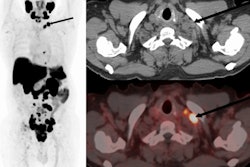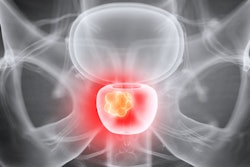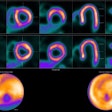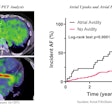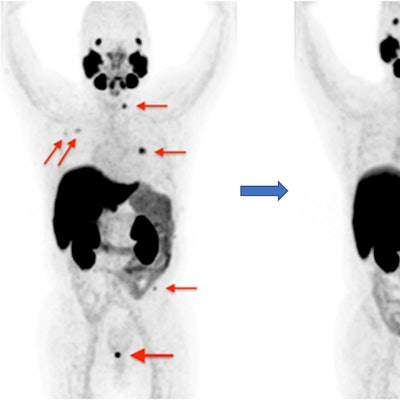
PET/CT imaging with an experimental F-18 prostate-specific membrane antigen (PSMA) radiotracer improves the care of patients with recurrent prostate cancer, according to a study published on January 7 in Research in Diagnostic and Interventional Imaging.
Researchers at the First Affiliated Hospital of Wenzhou Medical University in China showed that treatment decisions were improved in more than half of the patients who underwent PET/CT imaging using F-18 PSMA-1007.
"F-18 PSMA-1007 PET/CT has a high lesion detection rate for recurrent prostate cancer (PCa) and could have significant implications in decision-making treatment plans for the majority of PCa patients," wrote lead authors Jia Jiang and Lei Chen of Wenzhou University.
PSMA is a protein found on the surface of prostate cancer cells. PSMA molecules have been developed that bind to the protein, and when combined with isotopes such as gallium-68 (Ga-68) or F-18, the radiotracers allow researchers to locate these tumors on PET imaging.
Ga-68 PSMA-11 was approved by the U.S. Food and Drug Administration in 2020 for this use and has proven highly effective. Yet researchers continue to explore alternatives and suggest that tracers labeled with F-18 may broaden availability for this indication to satellite clinics, for example, given that the isotope has a longer half-life.
"So far, only a few studies have evaluated the clinical strategy role of F-18 PSMA-1007 PET/CT in guiding patients with biochemical recurrence after [radical prostatectomy]," the group wrote.
In the study, the researchers analyzed data on patients whose prostate cancer had returned after radical prostatectomies and extended pelvic lymph node dissection. They identified 114 patients who underwent F-18 PSMA-1007 PET/CT between March 2019 to July 2021. An experienced nuclear medicine physician examined treatment strategies for patients after F-18 PSMA-1007 PET/CT exams.
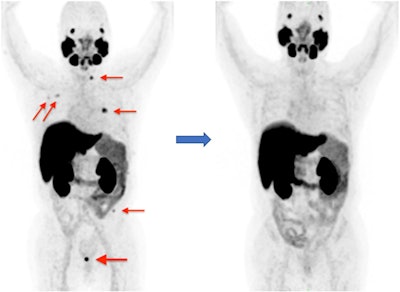 A maximum intensity projection image showing the presence of anomalous F-18 PSMA-1007 concentration in the pelvic cavity, suggesting local recurrence of prostate cancer (left, thick arrow), local bones metastasis on pretreatment examination (left, thin arrows), and their absence on post-treatment (stereotactic and androgen deprivation therapy) examination (right). Image courtesy of Research in Diagnostic and Interventional Imaging through CC BY 4.0 International License.
A maximum intensity projection image showing the presence of anomalous F-18 PSMA-1007 concentration in the pelvic cavity, suggesting local recurrence of prostate cancer (left, thick arrow), local bones metastasis on pretreatment examination (left, thin arrows), and their absence on post-treatment (stereotactic and androgen deprivation therapy) examination (right). Image courtesy of Research in Diagnostic and Interventional Imaging through CC BY 4.0 International License.The study showed that the stage of the disease changed in 63.2% of patients. Of these patients, 93.1% were upstaged. Results on F-18 PSMA-1007 PET/CT scans also prompted additional imaging in 57.1% of patients. Ultimately, the treatment category of 34.2% of patients changed from palliative to curative treatment, and 18.4% changed from curative to palliative treatment, for an overall treatment strategy change in 52.6% of patients, the authors wrote.
As well, the prostate-specific antigen (PSA) levels of the patients, which are used clinically to diagnose relapse, ranged from 0.2 ng/ml to 238.9 ng/ml, and these levels positively correlated with the imaging findings.
"Our study supports the advantages of F-18 PSMA-1007 PET/CT for patients with biochemical recurrence after radical prostatectomy, even at low PSA level," the authors concluded.






